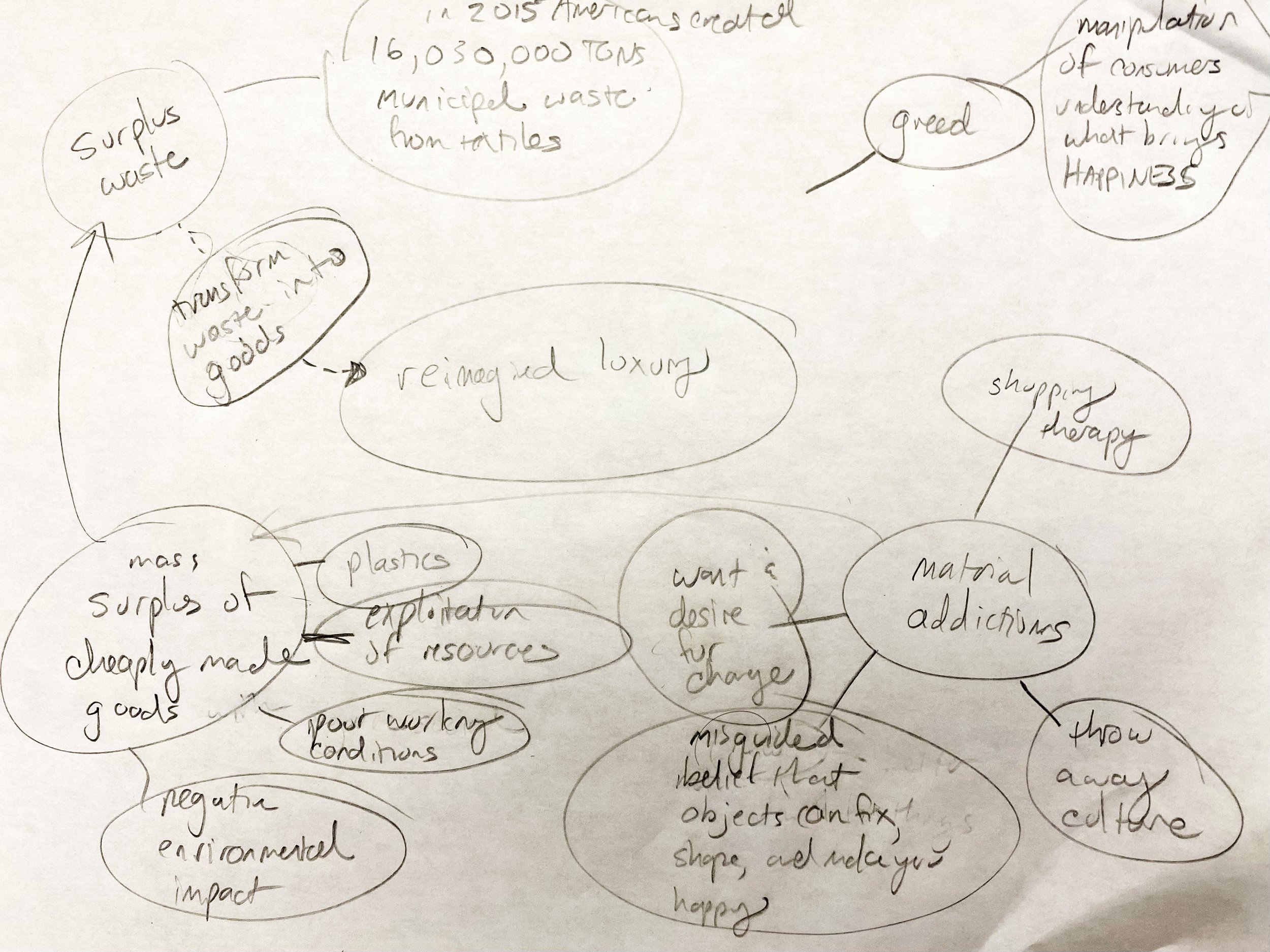Why DUO?
Human addiction to materiality and absurd production of surplus waste are inspirational cornerstones for my recent lines of artistic inquiry. In 2023, I founded The Department of Unqualified Observation (DUO) to make a self-sustaining business model around the practice of transforming castaway materials into art. Today's waste stream provides an endless resource of color, texture, and material to work with. In a sea of disposables, I find hope through a practice that regenerates, emotionally examines, and potentially reframes my own—and others’—complicated relationship with materiality. DUO creations are unique composites of 100% repurposed fabric, string, and retired household goods.

DUO’s notes on “practice”
Avoid buying anything new
All materials, including the string, fabrics, and hardware used to create DUO’s products have been foraged from closets and second hand stores. DUO passionately avoids buying anything new.
Hypocrisy is unavoidable
I admit to being a hypocrite, but avoid it whenever possible. For example, I drive my kids around everywhere. If we had an incredible bike path system (like Denmark does) I’d have them suited up in winter to bike to school. But we don’t.
(Attempt to) create new and sustainable systems
Is it possible to create luxury goods from castaway things? People will always want new stuff, but we believe old things can be made new again. DUO aims to reinvent castaways into goods that people want. Hopefully this process can inspire a new framework and relationship with materiality.
Why are we called the Dept. of Unqualified Observation?
You don’t need a PhD to observe the absurdities in the systems we live in—they are often quite obvious. And you don’t need a PhD to validate your points of view. While DUO consistently seeks out “expert” knowledge and opinion, we feel the role of the amateur has an important role to play in processing information.
Can handmade items become both sustainable and affordable?
My practice is a labor of love. My hourly earning rate is not quite on par with working as a server in the fast food industry. But I do enjoy my practice, and have high hopes to figure out how to make a reasonable living from it—(not only for myself, but for others too.)
My spirit animal is the “superworm” that can eat through polystyrene
In 2015, students at Stanford university discovered that mealworms could eat, sustain themselves, and break down many plastics. However, the process is slow and it would take about 3,000 worms to eat one styrofoam coffee cup. I am cheering these worms on, and they hold a special place in my heart.
“Investigative art approaches and exposes complex social and political systems through artistic investigations.”
Cultural addiction to materiality and an absurd production of surplus waste are inspirational cornerstones for my recent lines of artistic inquiry. Ignorance of the self harm—as well as the harm inflicted on others—practiced in our current systems of consumption bewilders me. This is especially apparent as we are directly challenged worldwide with indisputable environmental catastrophe.
Material addiction, a lack of self-awareness, and tremendous waste have permeated every aspect of our day-to-day lives. Attempts to follow reasonable and sustainable practices are thwarted by many factors including the unavailability of alternative choices, higher costs involved in well sourced goods, manipulative marketing, and the domination of major corporations over local markets. DUO recognizes that world views cannot be changed in a day, and that new technologies, systems, and values are necessary for change.
Fast Fashion Stats
60 % of all clothing produced ends up being incinerated or sent to a landfill within 1 year.
Our collective consumption of low-cost, low-quality apparel has more than quadrupled in the last thirty years and this glorified focus on bargain hunting at the expense of all else is not only decimating the planet, but also exploiting its most vulnerable women in the process.
Most of our apparel is now made from cheap synthetic fibers such as polyester (plastic), which are produced from fossil fuels and take hundreds of years to decompose, creating enormous waste and contributing to global warming.
Average Americans buy around 70 pieces of apparel each year and only regularly wear about 18% of what they have in their closet.
Apparel production is a dirty business, requiring an incredible amount of natural resources and the process results in the runoff of pesticides and chemicals into water supplies around the world, polluting the earth and causing human health problems.
Our well-meaning donations are drowning foreign countries in our trash to the point that many are actively rejecting our castoffs.
Our current rate of consumption and disposal is unsustainable but is expected to grow exponentially as the global population and consumption rates increase.
The industry needs an overhaul and fortunately, brilliant minds are at work and there are many easy (and free) steps you can take to minimize your impact.
(Stats and graphic borrowed from CederandSurf.com, thanks!)


